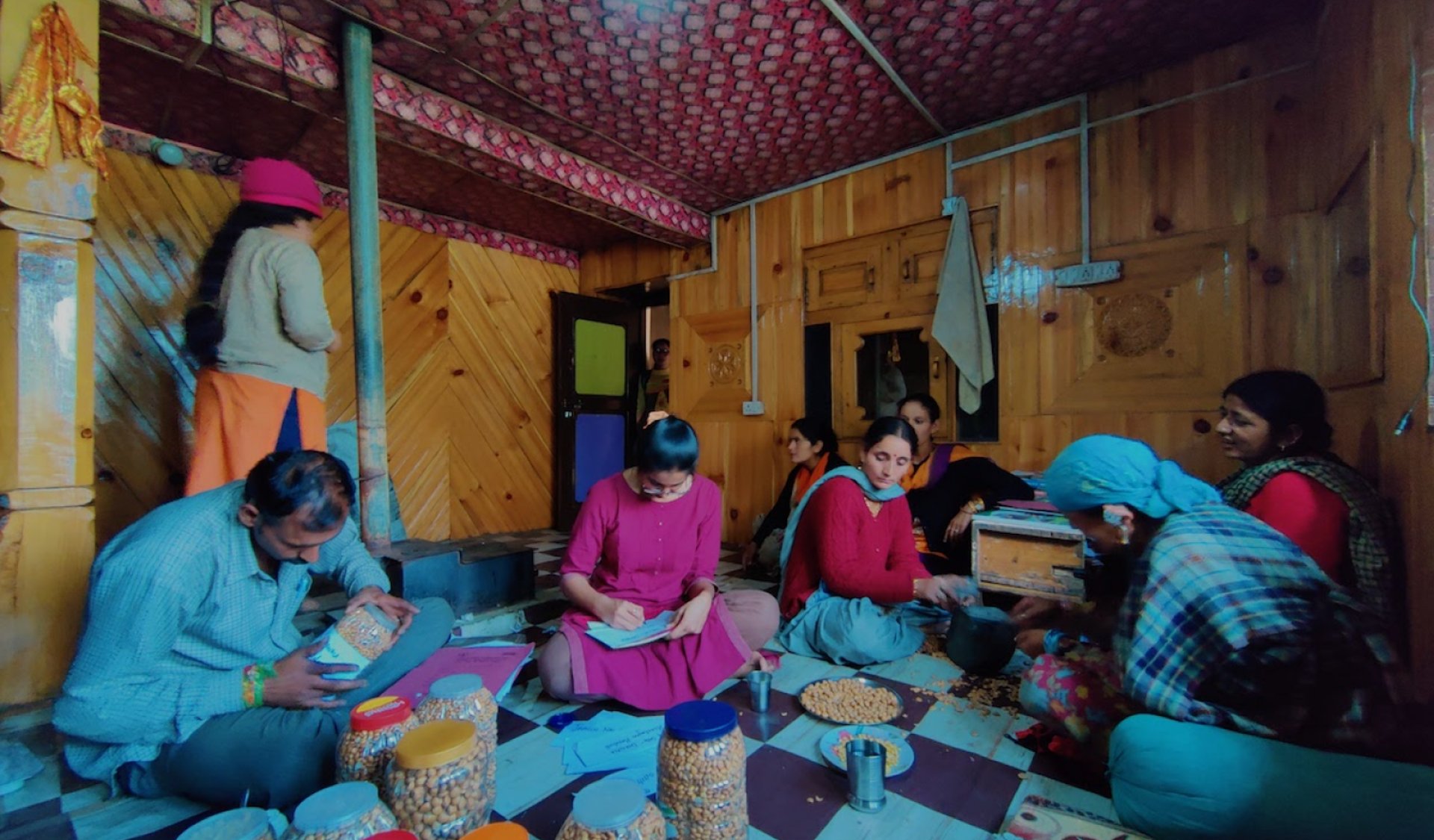
03.08.22
Formalising a Women-Led Supply Chain for Indian Hazelnuts in Himachal Pradesh
The forests of Himachal Pradesh are rich in seasonal forest products (SFPs), particularly hazelnuts and walnuts. These products have significant market potential both in India and abroad. Their collection and sale can provide forest-dependent communities with a reliable source of income and substantially strengthen the local economy.
Recognising this potential, the IoFE at ISB-BIPP has facilitated market linkages between the Pangi and Dhanala regions and Dry Fruitz Basket, a premium store in Hyderabad. This partnership aimed to test the market with small consignments—a strategy commonly used by retailers. Encouraged by the response to the initial consignment, the store placed a larger follow-up order. Dry Fruitz Basket also expressed interest in conducting pilot sales of other SFPs, such as kala jeera, herbs, and pine nuts, to assess their market viability.
Laying the Groundwork: Mobilising Self-Help Groups and Operationalising the First Shipment
In an effort to formalise the supply chain, we engaged with forest-dependent communities with Community Forest Resource Rights (CFRR) titles. Working through Gram Sabhas (GSs) in Himachal Pradesh, we facilitated collective action among self-help groups (SHGs) across neighbouring villages.
On 3 September 2022, our team met Ms Ratna (SHG President), Ms Leela (SHG Secretary), Mr Santaram Shastri, Pangi Field Assistant from the IoFE team, and other SHG members at the secretary’s house in Dhanala. Together, we developed a process plan to fulfil the buyer’s consignment requirements. We also discussed feedback on the challenges faced while preparing for the sale during the last two months and addressed various queries raised by the SHG members.
The women of Dhanala, with the support of the President and Secretary, agreed to form two additional SHGs. The existing groups were encouraged to include all interested women from the village.
A second meeting was held at the same venue, attended by the Women and Child Development (WDC) Cluster Coordinator of Saichu, Ms Yamini and Ms Apurva from the IoFE team, Mr Shastri, and SHG representatives. Our team elaborated on the first-mile logistics and the innovative processes to be adopted to facilitate the supply. During the discussion, Accredited Social Health Activist (ASHA) workers shared the challenges they faced in participating in SHG activities, particularly the loss of income from missing work. They were reassured that attendance was not mandatory; however, they were asked to inform the SHG leadership and our team if they were unable to attend.
Ms Leela raised an issue related to the requirement for the president’s and secretary’s presence for bank transactions, which sometimes led to additional expenses, such as needing a taxi ride back to Dhanala after forgetting a stamp. The Cluster Coordinator suggested that such costs be collectively shared, as occasional errors are inevitable. When a member enquired about the benefits of joining the SHG, Ms Ratna explained the many advantages, emphasising that, over time, all women in the village would be encouraged to join.
Following these discussions, Ms Ratna, Ms Leela, Mr Shastri, and three other SHG members collaborated on processing the hazelnuts—breaking the shells, cleaning the kernels, and preparing them for shipment. Pine needles and cones were used in place of conventional materials, such as plastic, paper, bubble wrap, and cardboard—reflecting the group’s commitment to eco-friendly practices. Mr Shastri suggested polishing the cones in a specific order to enhance their visual appeal, whereas Ms Ratna proposed collecting and drying the cones and needles as they fell to save time.
After three hours of effort, the hazelnuts were packed. Ms Ratna stitched a cloth cover for the cardboard boxes, adding a handmade and authentic touch. The hazelnuts were carefully packed in two sizes of plastic containers, weighed, labelled, and rebranded as ‘Jarhun Nag SHG Dhanala Pangi–Himalayan Hazelnuts’.
The first shipment from Dhanala comprised 22 kg of hazelnuts and 2 kg of walnut oil, which were sent to Dry Fruitz Basket in Hyderabad and AAK India Private Limited (AAKIPL) in Mohali, respectively. The lighter colour and improved taste of the new hazelnut harvest were noted during market evaluation.
Dry Fruitz Basket currently records an average daily sale of 100 kg across four varieties of hazelnuts. This demand has been driven by the unique origin of these products, which continues to serve as a compelling selling proposition. To support the sale of freshly harvested hazelnuts at the store, we developed a range of promotional materials—including leaflets, tabletop displays, shelf stickers, slides, and videos.
Following the successful sale of the first batch, the store owner was pleased with both the product quality and the promotional efforts. Encouraged by consumer interest in native products, he placed larger orders of shelled and unshelled hazelnuts and walnuts. These included 40 kg and 120 kg of hazelnuts, 40 kg of shelled walnuts (at ₹800/kg), and shelled pine nuts, scheduled for delivery by the end of September. Dry Fruitz Basket also agreed to stock broken kernels to cater to demand for affordable, native alternatives.
To meet the increased demand, two villages combined their harvests. On 10 October 2022, the second hazelnut consignment arrived at the Dry Fruitz Basket store. The owner expressed satisfaction with the quality and presentation—particularly the eco-friendly pinecone packaging—and indicated continued interest in sourcing pine nuts in the future.
Looking Ahead
The enthusiastic consumer response confirmed the market potential of these SFPs and validated our approach to linking industries with forest-dependent communities. We are proud that our collaborative efforts have culminated in a successful and impactful enterprise. The formalisation of the Indian hazelnut supply chain marked a significant step forward, with the consignment well-received and praised for its quality and sustainable packaging. Building on this momentum, our team is working to identify additional stores and partners to expand access to SFPs and strengthen forest-based livelihoods.
